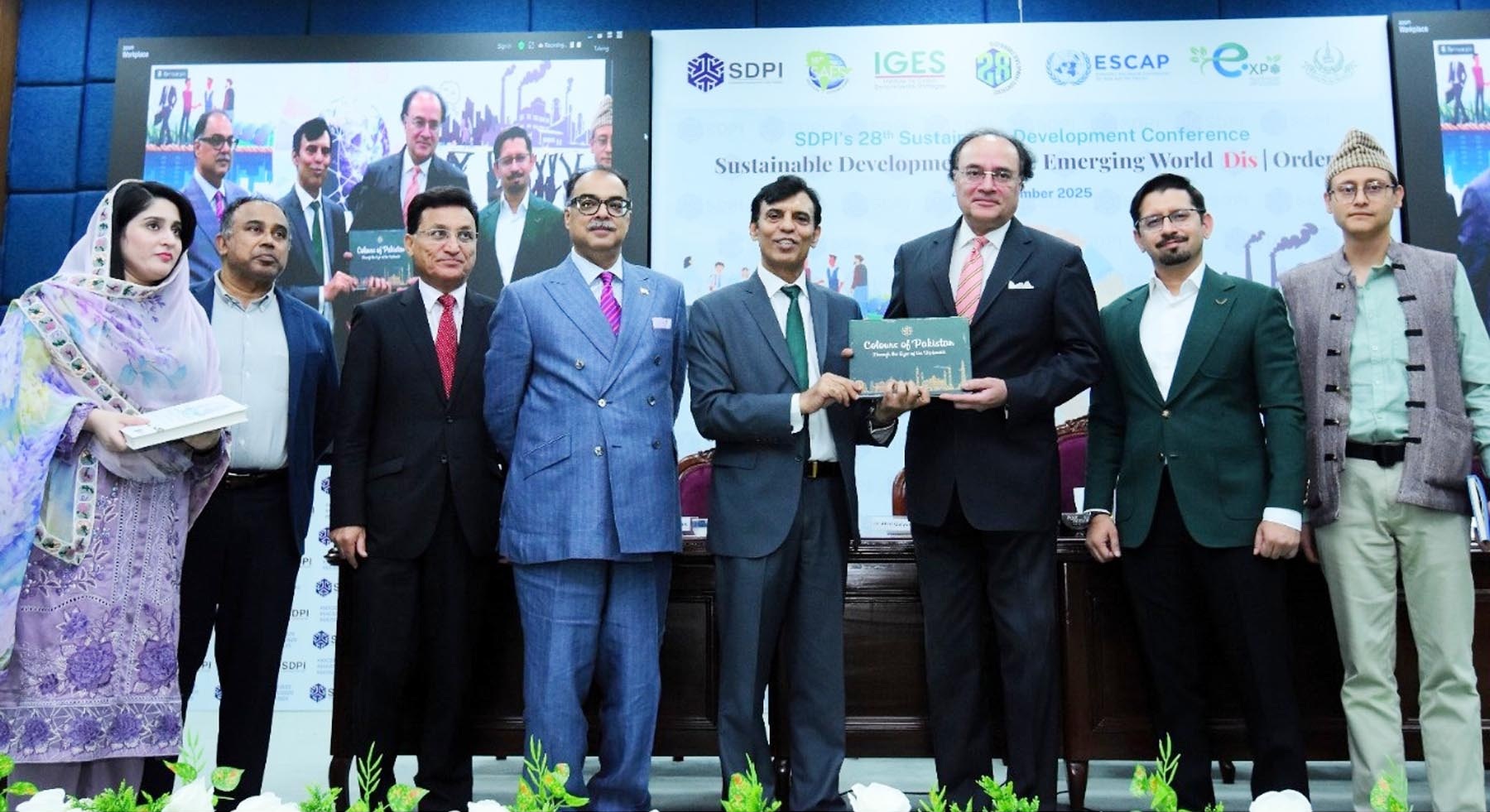Minister for Finance and Revenue, Senator Muhammad Aurangzeb, on Thursday, emphasised the need for pragmatic, coordinated, and forward-looking approaches to climate finance and sustainable development.
While speaking at the 28th Sustainable Development Conference (SDC) organised by the Sustainable Development Policy Institute (SDPI), the minister noted that despite global uncertainty, the world economy continues to show remarkable resilience, driven by structural reforms, private-sector dynamism and restrained protectionist policies.
He underlined that countries like Pakistan must continue to build strong fiscal and external buffers to manage potential external shocks amid rising protectionism and supply chain realignments.
Touching briefly on Pakistan’s emerging digital finance landscape, the minister referred to the creation of the Pakistan Crypto Council and the establishment of the Virtual Asset Regulatory Authority, which is being legislated through Parliament.
He reaffirmed that Pakistan’s approach to virtual assets and blockchain technology will remain firmly aligned with the country’s specific risk profile and regulatory priorities, including safeguards against capital flight, money laundering, and investor suitability.
Turning to the core theme of climate finance, Senator Aurangzeb highlighted Pakistan’s comprehensive framework that includes the National Adaptation Plan, Nationally Determined Contributions (NDCs), the Climate Prosperity Plan with the V-20, the Green Taxonomy issued by the State Bank, and the National Climate Finance Strategy rolled out in Baku last year.
He noted that while the global financing gap remains large, Pakistan already has sufficient resources and frameworks to begin effective implementation.
The minister informed that Pakistan has secured significant multilateral support, including $1.3 billion from the IMF under the Resilience and Sustainability Facility (RSF), $500 million from the Asian Development Bank, and a 10-year Country Partnership Framework with the World Bank Group worth $2 billion annually, focused primarily on climate change and population, two existential challenges for Pakistan.
Senator Aurangzeb called for realism regarding global climate finance mechanisms, noting that funds such as the Green Climate Fund and Loss and Damage Fund remain limited and bureaucratic. He stressed that Pakistan must focus on mobilising its own resources, private capital, and market-based mechanisms such as green bonds and carbon markets.
The minister also appreciated innovative private-sector initiatives, such as Acumen’s $90 million Climate Action Fund and Sindh’s pioneering mangrove carbon credit project, and urged that they be replicated and scaled up nationwide.
He highlighted the growing potential for debt-for-nature swaps and called for enhanced technical capacity to design, structure, and monitor bankable, investable climate projects meeting international standards.
Senator Aurangzeb underscored the vital role of finance ministries in mainstreaming climate action, observing that if climate priorities are not integrated into national budgets, they cannot become national policy. He reaffirmed the government’s resolve to prioritise climate change and population management within Pakistan’s economic and fiscal planning.
The minister urged collective ownership and coordination across all stakeholders, emphasising that Pakistan must make the most of existing opportunities and resources before seeking new policy instruments. “We must take ownership, coordinate better, and move forward with urgency to address these existential issues,” he stated.
He thanked SDPI and its international partners for hosting the regional dialogue and reaffirmed the government’s commitment to pursuing sustainable, inclusive, and climate-resilient economic growth.
Zafar Masud, Chairman of the Pakistan Banking Association, emphasised the need for a Regional Climate Bank to facilitate and manage climate funds across South Asia. He suggested integrating climate financing within the 27th Constitutional Amendment to ensure long-term policy coherence and noted that blended finance, a combination of public and private funds, is crucial to overcoming financial hurdles.
Additional Secretary and Head of Climate Finance at the Ministry of Climate Change, Zulfiqar Younas, discussed Pakistan’s development of its Carbon Policy and the role of the Securities and Exchange Commission of Pakistan (SECP) in mainstreaming green finance. He also advocated for circular economic models to promote sustainable resource use in the face of scarcity.
Experts at the plenary session, including Dr. Pushpam Kumar of UNEP and Dr. Premkumara Jagath of the Institute for Global Environmental Strategies, underscored the importance of blended finance for South Asia’s climate transition. Dr. Kumar stressed the need for credible carbon pricing and policy coherence, while Dr. Jagath urged South Asia to transition to a circular economy that focuses on sustainability.
In conclusion, Dr. Abid Qaiyum Suleri, Executive Director of SDPI, pointed out that despite pledges under the Paris Agreement, climate financing remains inadequate, with developed countries falling short of their financial commitments. He questioned whether the public and private sectors could meet the required targets, emphasizing the need for blended finance to be effectively implemented in Pakistan.
The session also marked the launch of SDPI’s report, “Beyond Pledges: Unlocking Pakistan’s Domestic Climate Finance Potential,” providing a roadmap to mobilize local and regional resources to build a climate-resilient economy.
Discover more from Brackly News
Subscribe to get the latest posts sent to your email.



